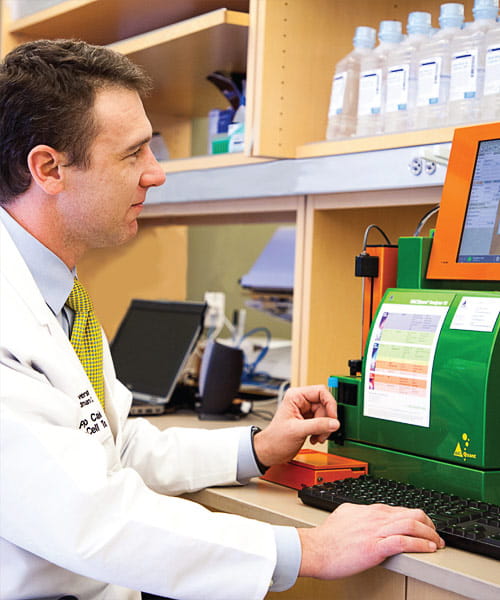Clinical Trials are Key to Survivability for Some Patients
George Miller, 63
From Hayesville in Ashland County
Surviving pancreatic cancer

George Miller thought he had the flu when he first went to the emergency room at UH Samaritan Medical Center last winter. Sudden weight loss and persistent hiccups helped physicians diagnose pancreatic cancer, and brought him under the care of physicians trained in the latest treatment for this insidious disease. A team of specialists coordinated George’s complex care at UH Cleveland Medical Center, and one surgeon served as a quarterback to orchestrate procedures and cancer treatment. Jeffrey Hardacre, MD, Chair, Surgical Oncology Quality Committee, UH Cleveland Medical Center, Interim Chief Medical Officer, UH Seidman Cancer Center, enrolled George in a clinical trial of an investigational immunotherapy agent that primed his immune system against his tumor and, with chemotherapy, the tumor cells. “Clinical trials are critical to improving outcomes,” declared Dr. Hardacre.
After postoperative immunotherapy and chemotherapy, George’s scan showed no evidence of cancer. Through UH Seidman Cancer Center’s broad network of community sites, George is able to continue infusion treatments at UH Sharon Health Center, closer to his home in rural Ashland County.
Using CAR-T to Battle Cancer

A revolutionary immunotherapy called CAR-T (chimeric antigen receptor T cells) is unleashing cellular soldiers in the bodies of lymphoma and leukemia patients whose cancer has stymied traditional treatments. CAR-T cells are re-engineered on site at the Cellular Therapy Laboratory that UH Cleveland Medical Center runs with Case Western Reserve University. Unlike other hospitals that do not manufacture their own CAR-Ts, UH’s cells are fresh and delivered in an average of two weeks – much faster than it takes for other hospitals to get frozen cells from commercial pharmaceutical manufacturers. “These T-cells have a biologic function, but we’re making them more sophisticated,” said Jane Reese-Koc, MT, MBA, Operations Director of the Cellular Therapy Service, UH Stem Cell Transplant Program. “Rarely do we see a treatment work this well, this fast. It’s remarkable.” Added Paolo Caimi, MD, Medical Director, Clinical Trials Unit, UH Seidman Cancer Center, “This is the beginning of a new wave of cellular therapies and our current CAR-T trial, along with commercial CAR-Ts, are the tip of the iceberg. The ability to offer our patients clinical studies with locally manufactured, advanced cell therapies is a privilege as a clinician and a researcher, and we hope this research can expand soon to treat other cancers.”


